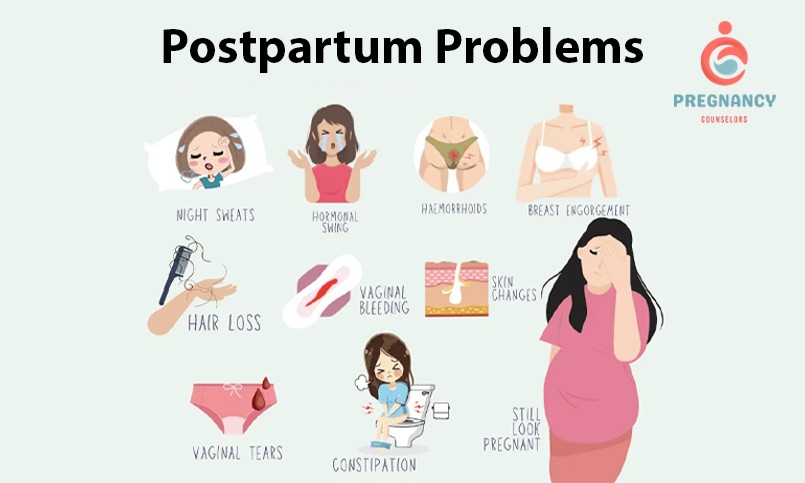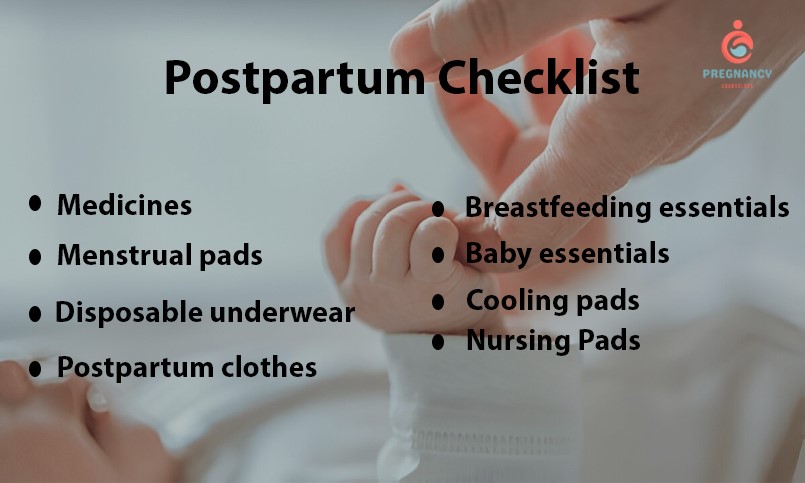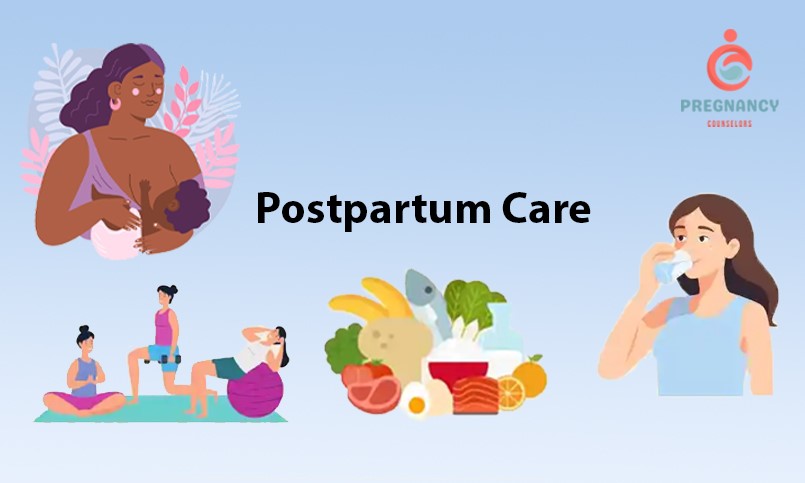The healing phase for the mothers after giving birth is considered as the postpartum phase. This phase after birth is complicated and challenging for every parent. The mixed feeling of joy and adjustment results in psychological stress. Mothers generally experience a seesaw of mixed emotions. At that time every mother needs extra attention and care. Therefore, it follows that the baby will be healthier if the mother is happier. The social, physical, and psychological well-being of mother and child is considered under postpartum care and is essential for the postnatal recovery. The postpartum duration is 4 to 6 weeks.
Postpartum problems
Woman generally feel a lot of problems after the childbirth and those postpartum problems can lead to health issues to the mothers and to the baby as well. Some of the common problems faced by the mothers are:

- Breast engorgement: the swelling or engorgement of breast is a normal problem happen during the initial days of after the delivery or if the mother do not feed the child often. The body takes time to adjust according to the need of the child. Due to engorgement, the mother feels pain, tightness, swelling in the breast. To ease the pain and soreness it is recommended to try breast pumps or manual press before nursing the child and after or in-between the nursing ice packs or ice pads can be used. Doctors also recommend many nipple creams to ease the pain and hardness.
- Constipation: Many women feel constipation and doctors generally advice to take the stool softener for few weeks after the childbirth. It is also recommended to take food rich in fiber and drink plenty of water to manage the digestion.
- Vaginal discharge: the vaginal discharge after childbirth is common and it also contains blood along it some mucus.
- Pain: pain in the uterine area, back and at the lower abdomen are common after giving birth. Doctors suggest medicines to ease the pain and light exercises are also recommended to relax the body.
Postpartum Care
The postpartum care is the most important and highly neglected phase which results in several deaths and health problems. To overcome these health issues here are a few health advice provided by the pregnancy counselors or healthcare advisers.
- Get plenty of water: water helps in managing the blood flow level and pain after the birth alongside it also hydrates the body.
- Monitor the changes and update the required details to the pregnancy counselors for example if you feel extreme pain in the pelvic area. Then, first follow the medications and then seek help from the healthcare advisor because the body needs to heal properly and it requires the advised diet.
- Nutritious Meal: To achieve desirable health one should always follow a nutritious diet and following the proper healthy diet during the postpartum phase is obligatory because a woman loses nearly 500 to 1000 ml of blood during childbirth. Mothers should include foods rich in protein for quick healing and for breastfeeding.
Most of post-pregnancy deaths take place due to extreme loss of blood which is considered as postpartum hemorrhage
- Exercise: In the postpartum phase it is generally assumed to take proper rest and avoid doing any physical activity but most of the pregnancy counselors suggest to new mothers that it is completely safe to exercise after a week or two as it will help them to cope with tiredness and refresh. Heavy weights and exercises are not recommended. Light exercise such as walking is suggested.
- Stick to medication as it will help in fast healing.
Mothers after postpartum feel stressed about the personal needs or arrangements post-delivery for the new member. The joy of parenthood and the adjustment phase give psychological trauma. To manage postpartum stress one should have a postpartum checklist.
Postpartum Checklist
The postpartum checklist contains all the essential items required during the postpartum phase. Mothers need to pack a delivery and postpartum bag for the hospital because the postpartum begins just after the delivery of the placenta. So, here is the postpartum checklist that should be carried to the hospital and kept at home.

- Medicines: the pain relief and healing medicines that are prescribed by the doctors after the delivery need to be added to the checklist. After the delivery, the mothers experience extreme pain. Do not take any over-the-counter medicine without consultation because not every pain relief medicine is safe for breastfeeding mothers. Doctors also advise numbing creams or sprays to ease the external pain and swelling.
- Menstrual pads: menstrual pads are an essential postpartum requirement. The postpartum menstrual pads are different from the regular pads and are needed to keep the menstrual pads along with regular pads. Using menstrual cups or tampons needs to be avoided.
- Disposable underwear: Underwear is among the prior essentials of the pregnancy checklist because it requires the use of the menstrual pads. It is suggested to have cotton-designed underwear. Although it is also advised by the pregnancy counselors or healthcare advisors to carry disposable underwear or adult diapers to maintain hygiene post-delivery.
- Postpartum clothes: the postpartum clothes are comfortable and easy to use while breastfeeding. They are soft and breathable.
- Breastfeeding essentials: The postpartum checklist needs to have breastfeeding essentials. Breast Pumps, pillows, maternity bras, nipple creams, and nursing pads are some of the important requirements.
- Baby essentials: the new born also require few essentials such as bottles, burp clothes, blankets, diapers, baby wipes, rash creams or powders.
- Cooling pads or ice packs are helpful with the soreness.
Nursing Pads are the disposable pads worn inside the bra. It is important as it helps to soak the leaked breast milk. Leakage of breast milk is common for new mothers or breastfeeding mothers.
Maternity Bras have small openings over the breast, if the mother needs to breastfeed she can do that without removing the bra or being uncomfortable with clothes, especially in public places.
Breast pumps are helpful for the mother if the child is in NICU, sleeping, unable to breastfeed naturally or during traveling.
After the pregnancy it is common to experience postpartum depression due to rapid change of in hormones but ignoring the postpartum issues will lead to the major challenges in the health.
Relax and Recover.
Check out our other Preganancy realted Blogs here
FAQS
What postpartum items do I need?
Items such as medicines, menstrual pads, disposable underwear’s, maternity clothes, baby clothes, breast pump, nipple cream, pain relief spray or creams, disposable wipes, towels adult diapers and baby diapers are the important postpartum items.
What not to do right after giving birth?
After giving birth the mother body needs a proper rest. Therefore, doing heavy exercise and carrying weight is forbidden. The mother can go for walking or light exercises. Drinking alcohol and smoking should be avoided.
How long do moms stay in postpartum?
The postpartum period is of 6 to 8 weeks after the delivery. Theses weeks of postpartum are the recovery and adjustment weeks where the mother adjust and recover from the issues caused during childbirth.
What is the 40 day rule after birth?
The 40 day rule after birth generally helps the mother to relax and recover from the mental and physical stress. During these 40 days a mother needs to rest and have high nutrient meal.
What a woman needs postpartum?
A woman needs a proper rest, nutritious meals and postpartum care. To manage and recover with the issues faced after giving birth.

